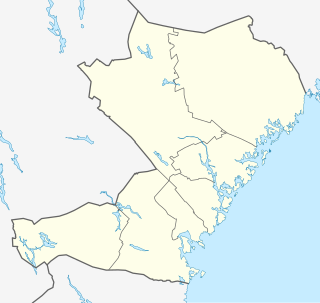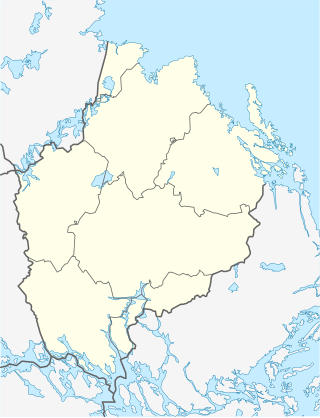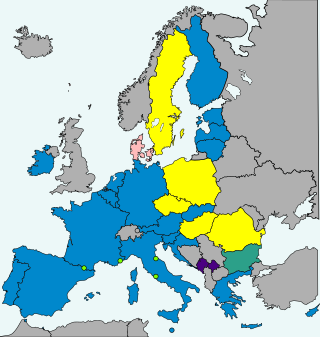
Blekinge County is a county or län in the south of Sweden. It borders the Counties of Skåne, Kronoberg, Kalmar and the Baltic Sea. The capital is Karlskrona. It is the smallest of the present administrative counties of Sweden, covering only 0,7% of the total area of the country.

Västernorrland County is a county (län) in the north of Sweden. It is bordered by the counties of Gävleborg, Jämtland, Västerbotten and the Gulf of Bothnia.

Uppsala County is a county or län on the eastern coast of Sweden, whose capital is the city of Uppsala. It borders the counties of Dalarna, Stockholm, Södermanland, Västmanland, Gävleborg, and the Baltic Sea.

Skåne County, sometimes referred to as Scania County in English, is the most southern county, or län, of Sweden, basically corresponding to the traditional province Scania. It borders the counties of Halland, Kronoberg and Blekinge and connects to Capital Region, Denmark by the Öresund Bridge. The seat of residence for the Skåne Governor is the city of Malmö. The headquarters of Skåne Regional Council are located in both Kristianstad and Malmö.

Stockholm County is a county or län on the Baltic Sea coast of Sweden. It borders Uppsala County and Södermanland County. It also borders Mälaren and the Baltic Sea. The city of Stockholm is the capital of Sweden. Stockholm County is divided by the historic provinces of Uppland (Roslagen) and Södermanland (Södertörn). More than one fifth of the Swedish population lives in the county. Stockholm County is also one of the statistical riksområden according to NUTS:SE, Nomenclature of Territorial Units for Statistics within the EU. With more than two million inhabitants, Stockholm is the most densely populated county of Sweden.

Jönköping County is a county or län in southern Sweden. It borders the counties of Halland, Västra Götaland, Östergötland, Kalmar and Kronoberg. The total county population was 356,291 inhabitants in September 2017. The capital and largest city is Jönköping. About one quarter of the total county population lives in the combined Jönköping-Huskvarna urban area around the southern point of Lake Vättern.

Kronoberg County is a county or län in southern Sweden. Kronoberg is one of three counties in the province of Småland. It borders the counties of Skåne, Halland, Jönköping, Kalmar, and Blekinge. Its capital is the city of Växjö. While Kronoberg is an inland county, the southernmost fringes are about 20 kilometres (12 mi) from the coastline.

Örebro County is a county or län in central Sweden. It borders the counties of Västra Götaland, Värmland, Dalarna, Västmanland, Södermanland and Östergötland. It is frequently culturally divided into the hilly northern region of Bergslagen, where mining and metallurgic industry have been important since the Middle Ages, and the southern Mälardalen of lakes and farms.

Karlstad Municipality is a municipality in Värmland County in west central Sweden. Its seat is located in the city of Karlstad.

Västerbotten County is a county or län in the north of Sweden. It shares the borders with the counties of Västernorrland, Jämtland, and Norrbotten, as well as the Norwegian county of Nordland and the Gulf of Bothnia. Its capital is Umeå that houses about half of the population when combined together with the largest town in the northern part Skellefteå. The two municipalities themselves are making up the majority of the population. The county has vast wilderness areas and Västerbotten County has a land area larger than Denmark, the Netherlands and Switzerland.
Elections in Sweden are held once every four years. At the highest level, all 349 members of Riksdag, the national parliament of Sweden, are elected in general elections. Elections to the 20 county councils and 290 municipal assemblies – all using almost the same electoral system – are held concurrently with the legislative elections on the second Sunday in September.

Halland County is a county (län) on the western coast of Sweden. It corresponds roughly to the cultural and historical province of Halland. The capital is Halmstad.

Region Gotland, officially Gotlands kommun, is a municipality that covers the entire island of Gotland in Sweden. The city of Visby is the municipality's seat. Gotland Municipality is the 39th most populous municipality in Sweden.
The government agencies in Sweden are state-controlled organizations that act independently to carry out the policies of the Government of Sweden. The ministries are relatively small and merely policy-making organizations, allowed to monitor the agencies and preparing decision and policy papers for the government as a collective body to decide upon.

Region Scania is the regional council of Scania County in Sweden. Scania County was formed on January 1, 1999, by the amalgamation of the county councils of Malmöhus County and Kristianstad County and some of the tasks handled by Malmö Municipality.
The Ministry of Culture is a ministry within the government of Sweden responsible for culture policy. The ministry is headed by the Minister for Culture, currently Parisa Liljestrand (m).

A non-binding referendum on introduction of the euro was held in Sweden on 14 September 2003. The majority voted not to adopt the euro, and thus Sweden decided in 2003 not to adopt the euro for the time being. Had they voted in favour, the plan was that Sweden would have adopted the euro on 1 January 2006.
The Government of the Kingdom of Sweden is the national cabinet of Sweden, and the country's executive authority.
Local elections were held in Sweden on 9 September 2018 to elect the 20 county councils and 290 municipal councils. Advance voting was allowed between 22 August and 9 September. The elections took place alongside the general elections.
Sweden held a non-binding referendum on the introduction of the euro on 14 September 2003.













